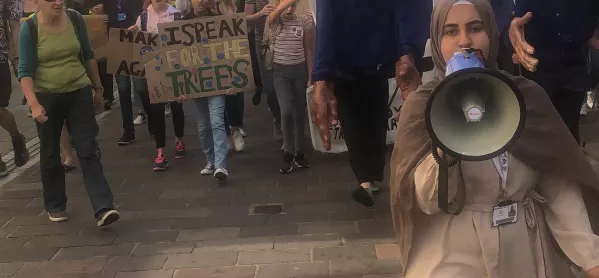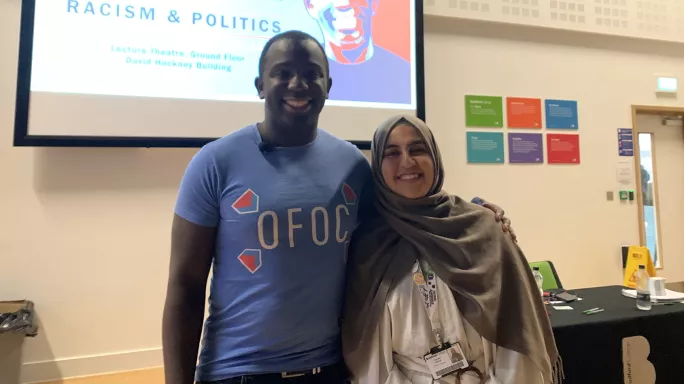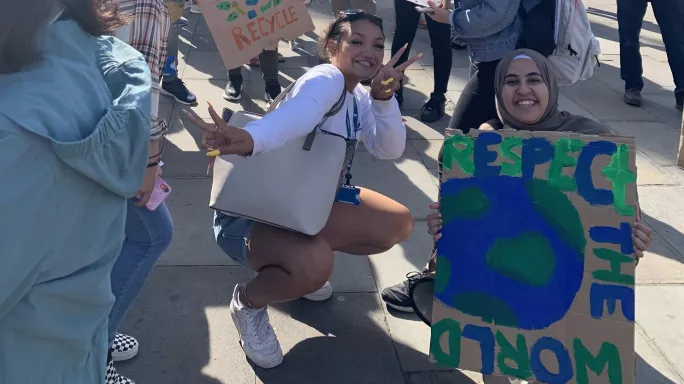- Home
- Meet Salsabil Elmegri: NUS’ new VP further education
Meet Salsabil Elmegri: NUS’ new VP further education

“For me, being NUS vice-president is about being a role model for further education students, but, most importantly, it’s about being one for my siblings and my family,” says 21-year-old Salsabil Elmegri.
Elmergi has three sisters and a brother, and, with her being the eldest, they all look up to her. Throughout lockdown, she’s given them plenty to aspire to.
Elmergi’s life has changed a lot in the past six months. Like the rest of the country - and indeed, the world - she has had to adjust to spending weeks on end at home, unable to socialise with her friends or go to work.
However, as well as living with the impact of Covid-19, Elmergi has been facing an entirely different challenge: becoming the vice-president (further education) of the National Union for Students.
It’s a role she says she never planned for - and it’s one that now, as students settle into a very different college life, is needed more than ever.
News: Colleges must prioritise student wellbeing, says NUS
Coronavirus: 1 in 4 students unable to access online lessons, say NUS
Background: NUS elects new vice-president for further education
Elmergi was born in Tripoli, Libya, before moving to Bradford, West Yorkshire, when she was 10 years old. She says that in her early childhood, she spent half her time in Libya and half in Bradford as her father studied for a master’s degree in the UK.
Moving to the UK from Libya
When he was given the opportunity to study a PhD several years later, the family decided to move permanently to England - “We actually ended up living on the same street again, it was such a great coincidence,” she laughs.
When Elmergi started secondary school in Bradford, she had very little English.
“I was so nervous. I was going to say scared but I wasn’t really scared, I was more nervous. It was because of the language barrier. I had a little bit of English, and I barely knew anyone,” she says.
“I did end up getting bullied. We moved through that but that wasn’t very fun. But generally, I had a great time at secondary school. I socialised a lot with my friends. “
She didn’t get the GCSEs she needed to go on to the local sixth form and instead went to Bradford College to retake her maths GCSE and do a BTEC in triple science. At college, she says she was treated like a human being.
College was ‘welcoming’
“I preferred college to school. It was a lot more welcoming - it was a lot more like, ‘You can be who you are here.’ There was no judgement,” she says.
“We are treated like adults. It was up to you whether you wanted to do your work or not, and you had that dignity and that interaction with your teachers.”
Elmergi went on to study an access-to-HE course in biology and chemistry, hoping to become a gynaecologist. She says that she had planned to go on to university to study medicine but “life took her in a different direction”.

This was sparked, in fact, by the size of a classroom. She was part of a big class that was taught in a tiny classroom - and she decided to do something about it. Elmergi became a student representative for her class, attended regular meetings with college leadership and campaigned for a bigger classroom. She won.
From class representative to NUS vice-president
A few months later, an email from the Bradford students’ association dropped into her inbox. The union was advertising for a VP of education welfare, and the description said that the role involved organising a lot of events.
“I’m not going to lie - I didn’t know what I was getting into,” she says. “I love organising things. I love making sure that people are heard, but I didn’t know that it was a student political movement. I just went in thinking that I was going to organise events or whatever, and then later on, I found out that actually it was a lot more than that.”
Elmergi describes going to the NUS national conference in Glasgow for the first time as “an eye-opening experience.” She says that although she didn’t understand what a lot of people were talking about, she knew that she really wanted to get involved.
“I went there not knowing what to expect. I really did enjoy my time, although I barely understood what people were saying. I really enjoyed voting for the full-time officer team. I wish I knew a lot more people because then I would have been able to go to the interactive sessions like after the conference, but I just went to my hotel room and watched Netflix,” she laughs.
“But now, I’d gladly be able to go to all of those events - and understand what’s going on.”
She says that she never expected to find herself in that full-time officer team a year on. A friend encouraged her to go for it, and she thought, “Why not?” But even then, it was never an expectation that she would win.
“I remember telling my parents, ‘This is a long shot for me winning. I just want to try and see what happens.’ I knew that if I did win, I’d be a good candidate, and that I’d bring a lot to the table, but I wasn’t expecting to win at all.”
Elmergi says that when the results came in virtually, she “ugly cried”.
“I fully was in shock. I was like, ‘Wow’ - the faith that everyone had in me. I’m so grateful for that. All the hard work campaigning paid off. What’s humbling is the fact that a lot of people trusted in me to vote for me and I love that and honestly like, I wouldn’t have been here without the students who have voted for me so like a massive thank you to them, honestly,” she says.

Arguably, those students need a champion more than ever - and Elmergi has her sights firmly set on making things better for them. First on her to-do list? Tackle internet poverty.
Tackling internet poverty
“It’s held a lot of students back. A lot of students either don’t have the facilities to go on to online teaching or if they do, it’ll be one laptop shared by the entire family. We need more funding from the government. I know some centres have been sending printed work to students, but my concern with that is how you then monitor progress,” she says.
“We’ve got the new vision for education campaign which is calling for all students to have the opportunity to have free access or funded lifelong education from cradle to grave, and in that we need to ensure all students get accessible education, and part of that is having the right equipment.”
Students will be pleased to know that climate change and sustainability also top her list of issues to tackle. She says that colleges need to be turning food waste into compost, they need to be plastic-free and they need to introduce a compulsory module within courses on awareness of the climate crisis.
And FE staff will be heartened to learn that she’s also concerned about a different kind of sustainability - financial sustainability and staff workload.
“It’s a huge concern for me, especially now with the reopening of colleges. Colleges are already so underfunded, and now a lot of staff have been made redundant, I’m worried about how they will manage students if the student population is a lot larger than the staff population,” she says.
“It’s the domino effect. If staff are overworked, the quality of teaching isn’t going to be as great. Even with outstanding staff being overworked, it reduces the quality of teaching. They’re having to be stretched out on multiple departments, they’re having to cover other areas that they might not be knowledgeable of because of lack of staff.”
Elmergi is clear on her goals for the two years that she’s in post. However, she’s a little unclear as to what her future will look like post-NUS.
She had wanted to become a gynaecologist - but now degree apprenticeships are looking more appealing. She says that she’s hoping to find one within the healthcare sector or perhaps go into medical engineering.
Her future may be uncertain - but if her current trajectory is anything to go by, it looks bright.
Keep reading for just £1 per month
You've reached your limit of free articles this month. Subscribe for £1 per month for three months and get:
- Unlimited access to all Tes magazine content
- Exclusive subscriber-only stories
- Award-winning email newsletters



